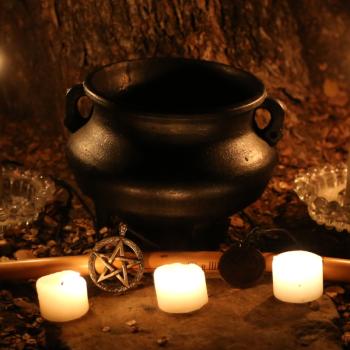On Sunday night I went for a walk with my beloved in the beautiful evening light. The rain had cleared, and the low summer sun was illuminating everything in a lovely dreamy gold. The sort of light that makes everything look as if it is lit from within. And because everything was freshly washed, it all looked brighter. The scent of roses and mock-orange filled the air, and the birds were singing. The trees hung over the path and formed a tunnel of green leaves.
At moments like that, when divinity shines within all things, I feel reconnected, refreshed, renewed. You might call it a moment of grace.

Reclaiming Grace
Can we reclaim the word “grace” from its Christian connotations? Certainly. Grace means something to be thankful for, something that is praiseworthy, desirable, elegant, right, and fitting.
grace (n.) late 12c., “God’s unmerited favor, love, or help,” from Old French grace “pardon, divine grace, mercy; favor, thanks; elegance, virtue” (12c., Modern French grâce), from Latin gratia “favor, esteem, regard; pleasing quality, good will, gratitude” (source of Italian grazia, Spanish gracia; in Church use translating Greek kharisma), from gratus “pleasing, agreeable,” from PIE *gwreto-, suffixed form of root *gwere– (3) “to favor” (source also of Sanskrit grnati “sings, praises, announces,” Lithuanian giriu “to praise, celebrate,” Avestan gar– “to praise”).
Sense of “virtue” is early 14c., that of “beauty of form or movement, pleasing quality” is mid-14c. In classical sense, “one of the three sister goddesses (Latin Gratiæ, Greek Kharites), bestowers of beauty and charm,” it is first recorded in English 1579 in Spenser. In music, “an embellishment not essential to the melody or harmony,” 1650s. As the name of the short prayer that is said before or after a meal (early 13c.; until 16c. usually graces) it has a sense of “gratitude.” As a title of honor, c. 1500.
The etymology of the word grace includes Greek charisma:
charisma (n.) “gift of leadership, power of authority,” c. 1930, from German, used in this sense by Max Weber (1864-1920) in “Wirtschaft u. Gesellschaft” (1922), from Greek kharisma “favor, divine gift,” from kharizesthai “to show favor to,” from kharis “grace, beauty, kindness” (Charis was the name of one of the three attendants of Aphrodite) related to khairein “to rejoice at,” from PIE root *gher- (5) “to desire, like” (see hortatory). More mundane sense of “personal charm” recorded by 1959.
Earlier, the word had been used in English with a sense of “grace, talent from God” (1875), directly from Latinized Greek; and in the form charism (plural charismata) it is attested with this sense in English from 1640s. Middle English, meanwhile, had karisme “spiritual gift, divine grace” (c. 1500).
And Charis was one of the three attendants of Aphrodite, the Greek goddess of love. These attendants were known as the Three Graces:
In Greek mythology, a Charis (/ˈkeɪrɪs/; Greek: Χάρις, pronounced [kʰáris]) or Grace is one of three or more minor goddesses of charm, beauty, nature, human creativity, and fertility, together known as the Charites /ˈkærᵻtiːz/ (Χάριτες [kʰáritɛːs]) or Graces. The usual list, from youngest to oldest is Aglaea (“Splendor”), Euphrosyne (“Mirth”), and Thalia (“Good Cheer”). In Roman mythology they were known as the Gratiae, the “Graces”. In some variants, Charis was one of the Graces and was not the singular form of their name.
Grace is also related to renewal and a sense of being right with the world and the divine. It isn’t on a list of ancient Roman virtues – the nearest concept is Laetitia, meaning “Joy, Gladness, The celebration of thanksgiving, often of the resolution of crisis.” I could certainly settle for Laetitia as a name for the feeling I was having.
But I am reassured by the idea that the Three Graces or Charites were definitely pagan. Among the Lacedaemonians, there were two Graces, Cleta (“Sound” or “Renowned”) and Phaenna (“Light” or “Bright”). The fact that a feeling of grace can be created by harmonious sounds and soothing light makes these names seem particularly apt. Splendor, Good Cheer, and Mirth also seem apt descriptors. And the more modern meaning of elegance and harmony also fits in with these ancient concepts of grace. I can think of several people whom I think of as being graceful in the way they interact with others.
So I think we can reclaim the word grace to mean the beauty and harmony and radiance of Nature and the feelings of awe and gratitude, wonder and joy and healing evoked by that beauty.
And we need these moments of blessing and grace to rest and renew when the magic runs out, when we are heartbroken by senseless slaughter, when sections of the Pagan community are being disappointing about gender.
















